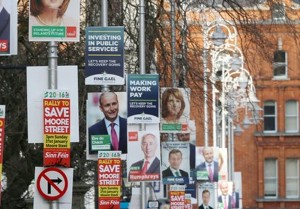
By Susan Gately - 19 February, 2016
 Exercise your democratic right and vote, and during this general election, “take stock of the health of the nation” and “how we respond to the plight of the most vulnerable,” the Catholic bishops have said.
Exercise your democratic right and vote, and during this general election, “take stock of the health of the nation” and “how we respond to the plight of the most vulnerable,” the Catholic bishops have said.
They also encourage the electorate to “engage with and challenge” their candidates about their commitment to issues and about their understanding of politics as “truly working and walking together to foster the common good”.
In a statement released on yesterday and signed by Archbishops Eamon Martin of Armagh, Diarmuid Martin of Dublin, Kieran O’Reilly of Cashel and Emly and Michael Neary of Tuam, the bishops focus on five key election issues: homes, education, security, health, the fostering of a solid human ecology, and international responsibility.
The crisis in homelessness affects not just those sleeping rough but those housed in inadequate accommodation like hotel rooms which are “totally unsuitable for children and families”, say the bishops.
Speaking on RTE Radio’s Morning Ireland yesterday, Archbishop Diarmuid Martin of Dublin said a whole industry had been created in hotels extending the tourist season to provide inadequate accommodation for families.
On education, the bishops say there has been much talk of “inequality in access to education” but the real inequality in Irish schools is “economic inequality where poorer communities and schools with a large percentage of disadvantaged children are not being adequately supported.”
They point in particular to the lack of opportunity for the most deprived like Travellers.
Shocking recent killings on the streets highlight the need for security and are the product of a “criminal industry of death which unscrupulously floods our streets and our children with drugs,” say the bishops.
The most fundamental obligation of the State is the protection of its citizens affirming that people will willingly support policies to strengthen an Garda Síochána.
On health, the bishops say that progressive governments have presented solutions which have failed or not been implemented.
Commenting on RTE radio, Archbishop Martin said the crisis was “not fault of nurses and doctors. Our politics has failed.”
Turning to “fostering human ecology”, the bishops say austerity is not a popular word but “there is another kind of austerity, that of simplicity in life-style in harmony with nature, through which all of us indicate where our real values lie, rather than in the empty values of consumerism.”
“A true human ecology recognises the equal right to life of every person from the moment of conception to the moment of natural death.”
The Constitution of Ireland embraces the right to life of the unborn child.
“It is a fundamental affirmation of equality, where the right to life of no child is considered of less value than that of another,” say the bishops adding that they “strongly oppose any weakening of the affirmation of the right to life of the unborn”.
Asked on radio if the bishops were telling people of faith not to vote for those who support the repeal of the 8th amendment, Dr Martin said it was not the job of the bishops to tell people how to vote.
People have to make a “mature decision”.
“I’m saying, ‘Here are the fundamental teachings of the Catholic Church.’ Then it is up to every person to make up their mind in conscience,” he said.
In their statement, the bishops also referred to immigrants saying as a traditionally emigrant country Irish people shared “a historical memory of how our emigrants were received”.
Now it is the time for Irish people to “reciprocate the experience of openness by welcoming to our communities people who flee from persecution, from economic exclusion or from religious discrimination”.
They also call on the next government to maintain its commitments in international life especially “commitments to finance development and to combat climate change”.
Pointing to Jesus’ account of the last judgement: “I was hungry and you gave me food….”, the bishops say the Christian in politics and society, “cannot renounce his or her special responsibility to protect the weak and the marginalised. This responsibility cannot be delegated or suppressed to party interests or emptied into the language of spin.”